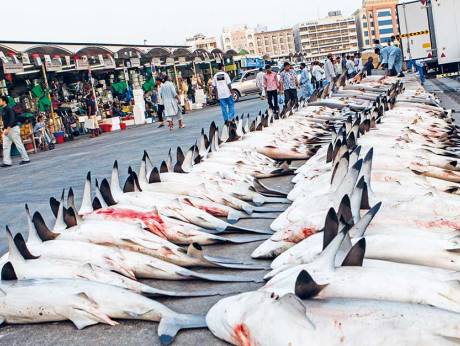Around the world sharks are in big trouble. Some shark species have declined by over 90% due to fishing, shark fining and shark mitigation strategies. Few know, often blinded by misguided fears, of the shark's current struggles and the impact this could have on human life. Sharks are quickly headed for extinction.
A number of scientific studies have demonstrated that the depletion of sharks results in the loss of commercially important fish and shellfish species down the food chain, including key fisheries such as tuna that maintain the health of coral reefs. As important apex predators, sharks have shaped marine life in the oceans for over 450 million years and are essential to the health of our oceans, and ultimately to the survival of humankind.
Sharks ensure our very survival.
The frightening reality is, like them or not, sharks play a crucial role on this planet. Remove sharks from the oceans and we are tampering with our primary food, water and air sources.
Sharks keep our largest and most important ecosystem healthy. Our existence, in part, is dependent upon theirs. Sharks have sat atop the oceans’ food chain, keeping our seas healthy for over 450 million years. They are a critical component in an ecosystem that provides 1/3 of our world with food, produces more oxygen than all the rainforests combined, removes half of the atmosphere’s anthropogenic carbon dioxide (greenhouse gas), and controls our planet’s temperature and weather.
The shark’s critical role.
As the apex predators of the oceans, the role of sharks is to keep other marine life in healthy balance and to regulate the oceans. Studies are already indicating that regional elimination of sharks can cause disastrous effects including the collapse of fisheries and the death of coral reefs.
A world without sharks?
One study in Belize has shown reef systems falling into extreme decline when sharks have been overfished, destroying an entire ecosystem. The downstream effects are frightening: the spike in grouper population (thanks to the elimination of sharks) resulted in a decimation of the parrotfish population, who could no longer perform their important role: keeping the coral algae-free and therefore reducing the oxygen quantities in our atmosphere. The knock on effects of this could be devastating for all life on Earth.
What legacy will we leave for our children?
We don't hear how the elimination of sharks might impact our best natural defense against global warming. Or how our favorite foods might disappear as a side effect of the extinction of sharks. Or that we could lose more oxygen than is produced by all the trees and jungles in the world combined if we lose our sharks. But we should.
Why we care.
No one knows for sure what will happen globally if shark populations are destroyed, but one should fear the results. Two hundred and fifty million years ago, this planet suffered the largest mass extinction on record, and scientists believe this was caused in part by catastrophic changes in the ocean. Sharks play a keystone role ensuring our seas remain in a healthy equilibrium and do not reach that point again.





